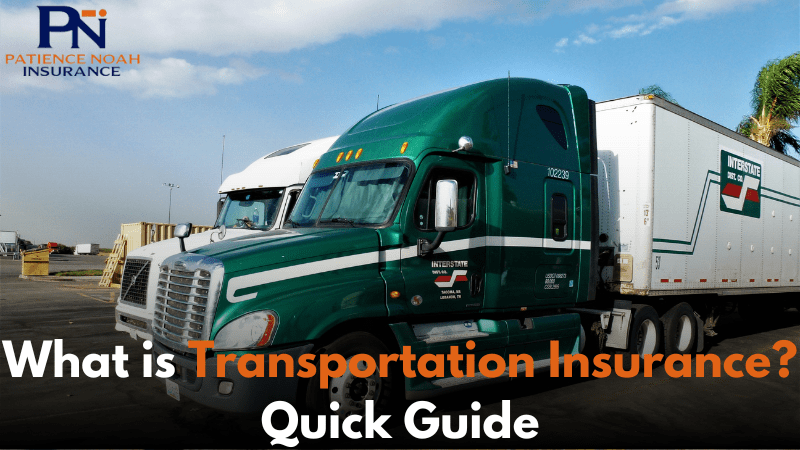Do you own a transportation business and seek the right insurance solutions to benefit your company? Patience Noah offers the best transportation coverage tailored to your needs. Keep reading this blog to learn more about transportation insurance and the types of businesses in this category.
What is Transportation Insurance?
Transportation insurance refers to the amount the insurer will pay in case of any damage to the goods or transporting vehicle. Thus, this insurance is used by companies that usually own a fleet of trucks or other vehicles to transport goods from one destination to another.
Many factors result in a company getting insurance for its transportation business. Goods that are being transported, particularly in bulk, are prone to damage by explosion, theft, impact fires, or mishandling.
Some individuals may also require insurance for their transport business, for example, if one of you is moving or relocating and wants to transport many goods to another location or overseas.
Types of Businesses Transportation Insurance Need?
Commercial Transportation insurance companies, wholesalers, retailers, and distributors are the most common businesses that fall under the businesses that need insurance. Cargo companies and companies that transport goods by air or rail also fall under the same category.
Any company that deals with transporting valuable goods and has a risk of losing potential capital if any damage or theft occurs to the goods qualifies to get transportation coverage through insurance.
Imagine risking losing a hefty amount just because you didn’t get coverage by insurance. The insurance can either be purchased by the company that owns the goods being transported or the company that owns the vehicle. You must carefully review the policy and clauses to find the right one for your business.
Types of Insurance for Transportation
Cargo Insurance
Cargo insurance covers cargo goods during transit if an unforeseen event occurs.
Liability Insurance
It provides coverage from third-party claims and is designed to prevent the owner from being liable for unforeseen incidents during transit.
Freight Insurance
This insurance category helps protect the carriers in case of damage or lost cargo.
Key Components of Transportation Coverage
Let’s break down the key components of transport insurance and how they work in simple terms:
1. Deductibles
Deductibles are like a small fee that you, as the owner of the goods being transported, agree to pay if something wrong happens during the journey.
For example, if your deductible is $500 and your cargo is damaged worth $2000, you would pay the first $500, and the insurance would cover the remaining $1500. The amount you pay can vary depending on the type of goods and policy you choose.
2. Premiums
Premiums are the payments you make to the insurance company to keep your insurance policy active; they are regular subscription payments.
Just like paying for a service, premiums ensure that the insurer will help cover the costs if something goes wrong during transportation.
3. Coverage Limits
Coverage limits are like the safety net provided by the insurance-providing company. It’s the maximum amount they’ll pay if something goes wrong with your cargo.
Let’s say your coverage limit is $50,000. If your cargo is damaged and the cost to fix it is $60,000, the insurance will only cover up to $50,000, and you’d have to pay the remaining $10,000.
4. Claims
Claims are like asking for help from the concerned company when something terrible happens during transportation.
If your cargo gets damaged or lost, you submit a claim to the insurance company, explaining what happened and providing evidence.
The insurance company will then investigate the claim, decide whether to approve it and compensate you according to your policy.
5. Risk Assessment
Risk assessment is like evaluating how likely something terrible will happen during transportation.
Insurance companies look at factors like the type of cargo, the distance it is traveling, and the mode of transportation to determine the level of risk.
The higher the risk of damage, the more you may have to pay premiums.
Tips for Choosing the Right Insurance for Transportation
Comparison is Key
Always shop around before you decide to buy insurance for commercial transportation. This will help you get an idea of cheaper yet better packages.
Customization Wins
Only invest in insurance if you ask questions or tailor the terms and conditions to meet your needs. You can decide the deductibles and premiums that suit your business type and smartly lower your transportation coverage costs.
Factors That Influence Transport Insurance Costs
1. Coverage Costs
The coverage provided by the insurance company will play a vital role in the cost of your insurance. You can customize and discuss the coverage options to suit your needs.
2. Deductibles
The amount of money you will pay out of your pocket is called the deductible. This can vary accordingly and can be decided before purchasing insurance.
3. Driving Record
The driver’s age, experience, and record significantly affect the cost of your transportation business insurance. Choose trusted, experienced drivers to have an upper hand while deciding the insurance cost.
4. Type of Goods
Fragile and perishable goods incur higher insurance costs than durable and non-perishable ones. Marine transportation and insurance costs also change with the types of goods being transported. For example, chemicals, fuels, and perishable items will cost more than regular items.
Conclusion
Transport insurance provides financial protection for your goods during transit and ensures a carefree journey. You pay premiums to the insurance company, and they agree to help cover the costs if something goes wrong, up to a specific limit. It’s like having a safety net for your cargo, giving you peace of mind during transit.















